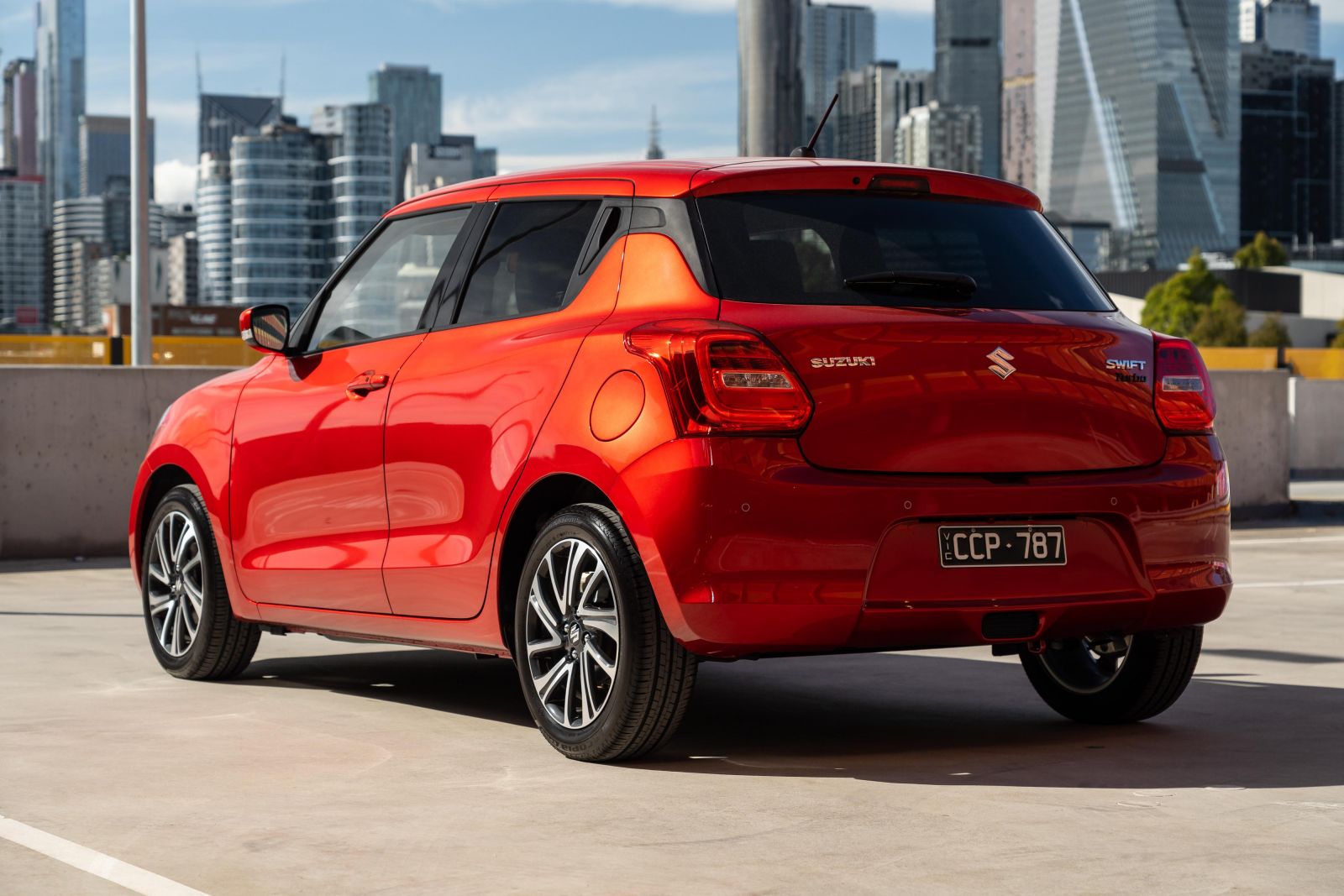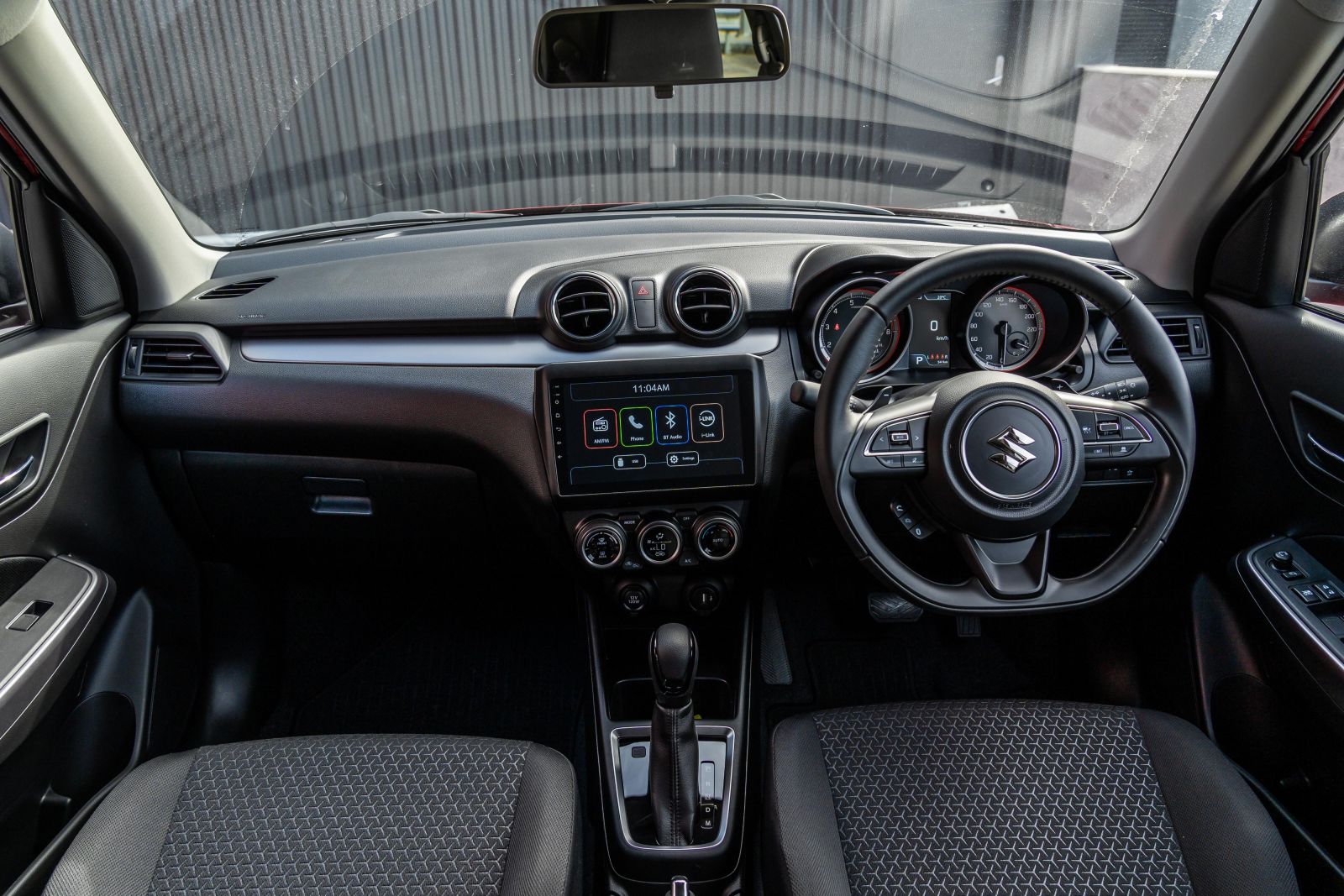Suzuki’s Baleno is dead – in Australia at least – so the even more familiar Swift is left to pick up the slack.
The Swift has always been the more Europe-focused of the two models, and that’s reflected in its styling.
With its turbocharged three-pot, the 2023 Suzuki Swift GLX Turbo arguably feels the most European of the lot. But the current Swift has now been on sale in Australia for six years, receiving only a minor update in 2020.
Even though the likes of Ford and Honda have exited the declining light car segment, there’s still some fresher competition around – okay, not much, but it exists.
The elephant in the room is the MG 3, which now has a share of over a third of the light car segment.
It has seemingly become the default choice for buyers just wanting a cheap runabout and who don’t want a crossover, but does the Swift GLX Turbo justify its significant premium over the cheap Chinese hatch?
How much does the Suzuki Swift GLX Turbo cost?
The GLX Turbo is priced at $31,290 drive-away, making it the second most expensive Swift after the Sport. Metallic and premium paint finishes cost an extra $595.
For context, the Swift range opens at $24,990 drive-away.
With the Kia Rio GT-Line gone and the Skoda Fabia now a more premium offering, there’s not a lot of direct competition for the Swift GLX Turbo.
The range-topping Mazda 2 G15 GT doesn’t offer a more powerful engine than its more affordable counterparts, but it retails for only $26,610 before on-roads. Other similarly priced rivals include the Volkswagen Polo Life auto ($28,750) and Toyota Yaris SX Hybrid ($30,030).
What is the Suzuki Swift GLX Turbo like on the inside?
The Swift’s dashboard is simple and straightforward and while it’s showing its age some, it’s logically laid out.
The infotainment touchscreen sits below a pair of vents and above three simple knobs for the climate control. A 12V and a USB-A outlet sit below these, while at the base of a centre stack there’s a shelf where you can put your phone.
The cupholders ahead of the shifter are awkwardly located, with tall bottles blocking key switchgear. They’re also square – fine if you drink Farmer’s Union iced coffee, but less accomodating for the average drink bottle.
There’s no centre console bin and armrest, with a small, open cubby instead sitting where these would usually be. This isn’t unusual for this segment, but it would be nice to see this penultimate Swift to include these features.
Other storage is decent: bottle holders in each of the doors swallow a 1L bottle, while the glove compartment has room for more than just the owner’s manual.
While the Swift’s interior is predominately black, there are some attempts to add contrast – a metal-look trim strip across the dash, and an interesting, rather Mercedes-like star pattern to the cloth upholstery.
We miss the colourful upholstery choices of the 1990s, but we welcome anything to break up the monotony of black cloth upholstery against black plastic trim.
All of said plastic trim is hard to the touch – hardly unusual for this segment – but it appears hard-wearing. Some cloth accents on the doors help break things up.
Our tester had an 9.0-inch touchscreen, a vestige of Suzuki’s brief foray during the height of the chip shortage into importing cars sans infotainment screens and having aftermarket units fitted locally.
Suzuki Australia has subsequently moved back to fitting 7.0-inch touchscreens at the factory which include embedded satellite navigation.
Despite the smaller size, we wouldn’t call a return to the 7.0-inch screen a retrograde step given the extra functionality and more polished appearance.
The reversing camera on our tester wasn’t particularly high-resolution, but fortunately visibility is quite good in the Swift so you won’t feel too disadvantaged.
The Bluetooth audio is also a bit tinny, with people complaining about the sound quality in calls.
The analogue instruments are clear and legible and bracket a small screen which features a digital speedometer – something missing from Suzukis like the Ignis.
At 180cm tall, I can comfortably sit behind my seating position with my knees only just brushing the seat backs. There’s also plenty of headroom, too.
There are two ISOFIX and three top-tether anchor points in the back for child seats.
Open the hatch and you’ll find 242L of cargo space, expanding to 556L with the rear seats folded. That’s quite a bit smaller than a Polo (351L) or Rio (325L), though close to a Mazda 2 (250L).
What’s under the bonnet?
The GLX Turbo is powered by a 1.0-litre turbocharged three-cylinder engine producing 82kW of power at 5500rpm and 160Nm of torque between 1500 and 4000rpm.
It’s up 16kW and 40Nm on the naturally-aspirated 1.2-litre four found in lesser Swifts, and swaps a continuously variable transmission (CVT) for a six-speed automatic with paddle shifters.
It uses a claimed 5.1L/100km on the combined cycle, or 0.3L/100km more than the 1.2-litre. Over a mix of inner-city, suburban and highway driving, we averaged 5.8L/100km.
It requires 95 RON premium unleaded fuel.
How does the Suzuki Swift GLX Turbo drive?
Given all Swifts have a kerb weight of under a tonne, even the base 1.2-litre has more than enough pep for commuting duties.
The turbo 1.0-litre, however, gives the Swift a little extra punch. The GLX Turbo has a kerb weight of just 945kg and therefore quite a favourable power-to-weight ratio of 88.6kW/t.
The engine has a bit of a boosty feel to it, but it’s a zippy unit and has no problem keeping up with traffic. It also doesn’t sound half bad either, with a fairly sporty engine note.
The Swift also avoids sounding too loud, even at highway speeds, with wind noise largely kept at bay. It’s not whisper-quiet, but it’s competitive for the segment.
The steering is nicely weighted and direct, with a good amount of road feel. This, coupled with the punchy engine and the balanced chassis, makes the Swift an enjoyable little thing to drive.
It’s enjoyable without sacrificing too much in the way of ride comfort. It’s generally comfortable for a light hatch, though you do tend to follow the surface of the road.
You’re almost guaranteed to accidentally knock the car into manual shift mode as this sits below drive on the shifter instead of, more logically, to the side. Don’t worry, the car will warn you by revving its guts out in first gear.
The six-speed automatic does a decent job shuffling between gears, though an engine like this is just crying out for a manual transmission. You can at least use the paddle shifters to manually select gears.
What do you get?
Swift GLX Turbo highlights:
- Automatic LED headlights
- Automatic high-beam
- Automatic climate control
- Power-folding exterior mirrors with integrated indicators
- Telescopic steering wheel adjustment
- Keyless entry and start
- 6-speaker sound system
That’s over and above equipment also found in lesser models:
- 16-inch alloy wheels
- Space-saver spare
- Front fog lights
- 7.0-inch touchscreen infotainment system
- Apple CarPlay, Android Auto (wired)
- Leather-wrapped steering wheel
- Tilt steering wheel adjustment
- Cloth upholstery
- 60:40 split/fold rear seats
The $3800 premium over the GL Plus seems fairly reasonable, particularly considering it brings a punchier engine.
Is the Suzuki Swift GLX Turbo safe?
The Suzuki Swift wears a 2017-dated five-star ANCAP safety rating, scoring 35.13 out of a possible 37 points in local testing.
The base GL has a lower four-star rating owing to its reduced roster of safety kit, with a score of 32.49 out of 37.
Standard safety equipment includes:
- Front, front-side and curtain airbags
- Adaptive cruise control
- Autonomous emergency braking (AEB)
- Blind-spot monitoring
- Lane departure warning
- Rear cross-traffic alert
- Rear parking sensors
- Reversing camera
While all Mazda 2 models come with blind-spot monitoring and rear cross-traffic alert and top-spec GT models also feature adaptive cruise control, there aren’t many other rivals that offer as long a list of safety equipment as both it and the Swift GLX Turbo.
You need to step up to a Polo Style for these features, and while all Yarises come standard with adaptive cruise control you’ll need to get the top-spec ZR if you want blind-spot monitoring and rear cross-traffic alert.
The Mazda 2 edges past the Swift overall, however, with the inclusion of a surround-view camera, lane-keep assist and traffic sign recognition.
How much does the Suzuki Swift GLX Turbo cost to run?
All Suzuki models are backed by a five-year, unlimited kilometre warranty.
Suzuki offers capped-price servicing for the first five years or 100,000km, whichever comes first.
Service intervals are shorter in the GLX Turbo than in 1.2-litre models, with visits required every 12 months or 10,000km (instead of 15,000km).
The first five services are capped at $319, $429, $329, $529 and $349, or $1955 over five years. Those prices are the same as in 1.2-litre models, albeit charged at the aforementioned shorter intervals.
A Mazda 2 costs less over five years ($1734), as does a Yaris ($1225), but the Swift undercuts the Polo ($2300 if pre-paid).
CarExpert’s Take on the Suzuki Swift GLX Turbo
For those of us who remember the days of $19,990 drive-away Nissan Pulsars, a $30k+ Suzuki Swift initially seems shocking.
Look a little closer – and keep in mind inflation, of course – and you can see the Swift nevertheless makes a solid case for itself.
The list of standard safety equipment is unlike any Swift of yore, and helps the Suzuki stack up well against key rivals. Only the Mazda2 can best it in this respect, but it can’t match the Swift’s turbo spunk.
If you just want a cheap little runabout and don’t care about safety or performance, MG will happily sell you an MG 3.
Where the Swift justifies the extra cost is with its greater equipment and its punchy powertrain, as well as its enjoyable dynamics.
It doesn’t offer much more than the humble MG in terms of interior panache, but while it’s all business with its sober colours and hard plastics it all feels convincingly screwed together. It’s pretty well packaged for occupants, too, even if it doesn’t have the largest boot.
The Swift does naturally benefit from the exodus of various key players, but even at six years old it still has plenty of charm.
Click the images for the full gallery
MORE: Everything Suzuki Swift

















